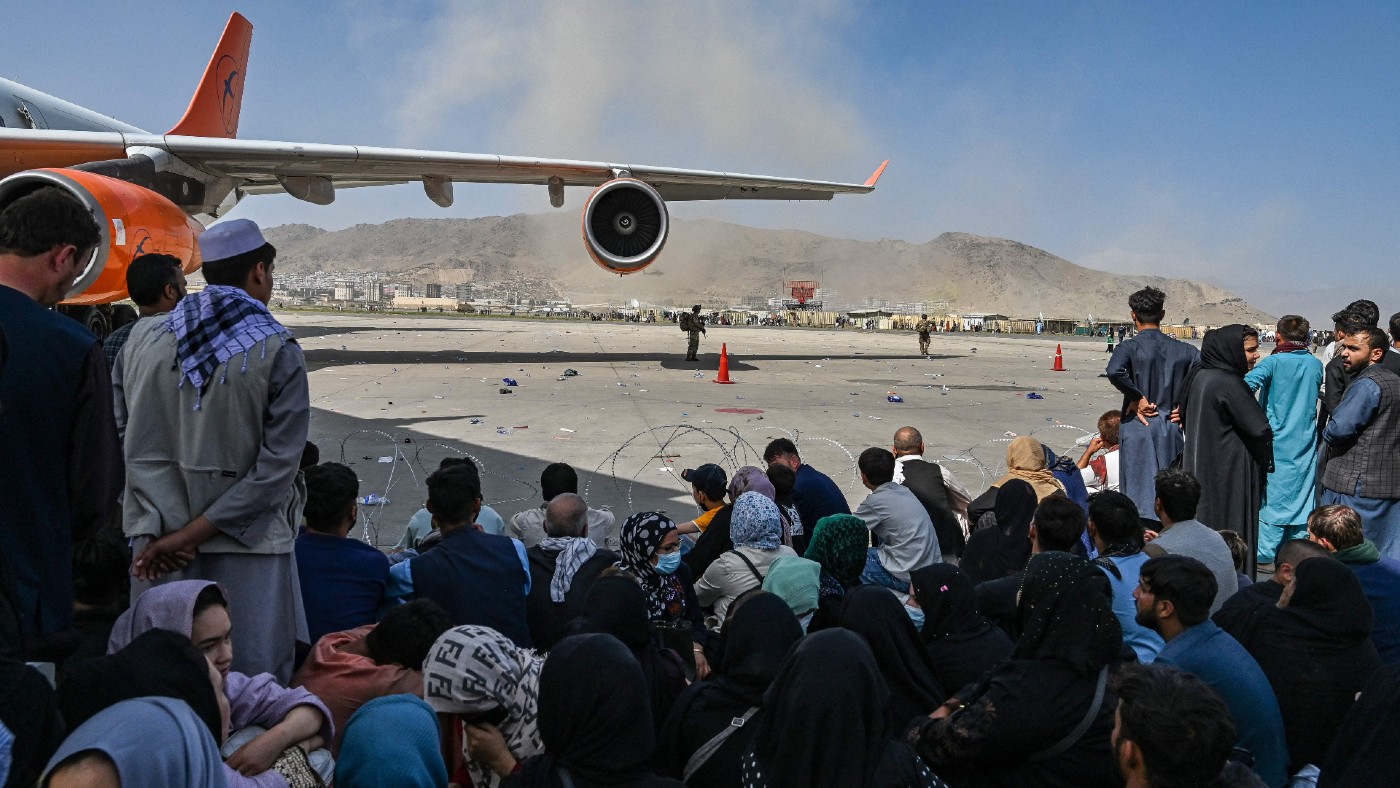Afghanistan: the looming refugee crisis
Exodus has sparked panic among Western leaders

A free daily email with the biggest news stories of the day – and the best features from TheWeek.com
You are now subscribed
Your newsletter sign-up was successful
For weeks now, flights from Kabul have been cram-full of fleeing foreigners and Afghans “lucky enough to have passports, visas and money”, said The Economist. Now the airport is the only part of the city not held by the Taliban. Instead it’s controlled by US forces, their Boeing C-17s “packed tightly” with refugees escaping the new regime. Tens of thousands could well follow in the weeks and months to come. And still more – mainly Shia Muslims in fear of the ferociously Sunni Taliban – are likely to pour into neighbouring countries like Pakistan and Iran, which is already thought to harbour some three million Afghan refugees.
The exodus has sparked panic among Western leaders, especially in Europe, who fear a repeat of the 2015 refugee crisis in which more than a million people arrived in the EU, said Daniel Trilling in The Guardian. France’s President Macron was quick to demand a “robust” EU plan to stem “irregular migratory flows”; southern European leaders voiced alarm at the prospect of a fresh influx of refugees landing on their shores. But other governments pledged to help resettle those in need: the US says it will take in 22,000 people; Canada more than 20,000; Germany 10,000.
And in the UK Boris Johnson has announced that his government is setting up a dedicated scheme to give those fleeing their homes in Afghanistan a safe and legal route to the UK, said Andrew Grice in The Independent. The “world-leading” plan, says the PM, will resettle 20,000 refugees in Britain over a period of five years – 5,000 of them within a year. These refugee figures are tiny compared to those that have attended previous US pullouts, said the FT: after the fall of Saigon in 1975, President Gerald Ford pushed through a scheme that took in 300,000 refugees from Vietnam, Cambodia and Laos by 1979. Such numbers may be unthinkable today, but if Western democracies are to atone for their mishandling of the Afghan withdrawal, they need to show willing in dealing with the “resulting exodus”.
The Week
Escape your echo chamber. Get the facts behind the news, plus analysis from multiple perspectives.

Sign up for The Week's Free Newsletters
From our morning news briefing to a weekly Good News Newsletter, get the best of The Week delivered directly to your inbox.
From our morning news briefing to a weekly Good News Newsletter, get the best of The Week delivered directly to your inbox.
A free daily email with the biggest news stories of the day – and the best features from TheWeek.com
-
 Local elections 2026: where are they and who is expected to win?
Local elections 2026: where are they and who is expected to win?The Explainer Labour is braced for heavy losses and U-turn on postponing some council elections hasn’t helped the party’s prospects
-
 6 of the world’s most accessible destinations
6 of the world’s most accessible destinationsThe Week Recommends Experience all of Berlin, Singapore and Sydney
-
 How the FCC’s ‘equal time’ rule works
How the FCC’s ‘equal time’ rule worksIn the Spotlight The law is at the heart of the Colbert-CBS conflict
-
 Corruption: The spy sheikh and the president
Corruption: The spy sheikh and the presidentFeature Trump is at the center of another scandal
-
 Putin’s shadow war
Putin’s shadow warFeature The Kremlin is waging a campaign of sabotage and subversion against Ukraine’s allies in the West
-
 The fall of the generals: China’s military purge
The fall of the generals: China’s military purgeIn the Spotlight Xi Jinping’s extraordinary removal of senior general proves that no-one is safe from anti-corruption drive that has investigated millions
-
 Epstein files topple law CEO, roil UK government
Epstein files topple law CEO, roil UK governmentSpeed Read Peter Mandelson, Britain’s former ambassador to the US, is caught up in the scandal
-
 Iran and US prepare to meet after skirmishes
Iran and US prepare to meet after skirmishesSpeed Read The incident comes amid heightened tensions in the Middle East
-
 Syria’s Kurds: abandoned by their US ally
Syria’s Kurds: abandoned by their US allyTalking Point Ahmed al-Sharaa’s lightning offensive against Syrian Kurdistan belies his promise to respect the country’s ethnic minorities
-
 Israel retrieves final hostage’s body from Gaza
Israel retrieves final hostage’s body from GazaSpeed Read The 24-year-old police officer was killed during the initial Hamas attack
-
 China’s Xi targets top general in growing purge
China’s Xi targets top general in growing purgeSpeed Read Zhang Youxia is being investigated over ‘grave violations’ of the law